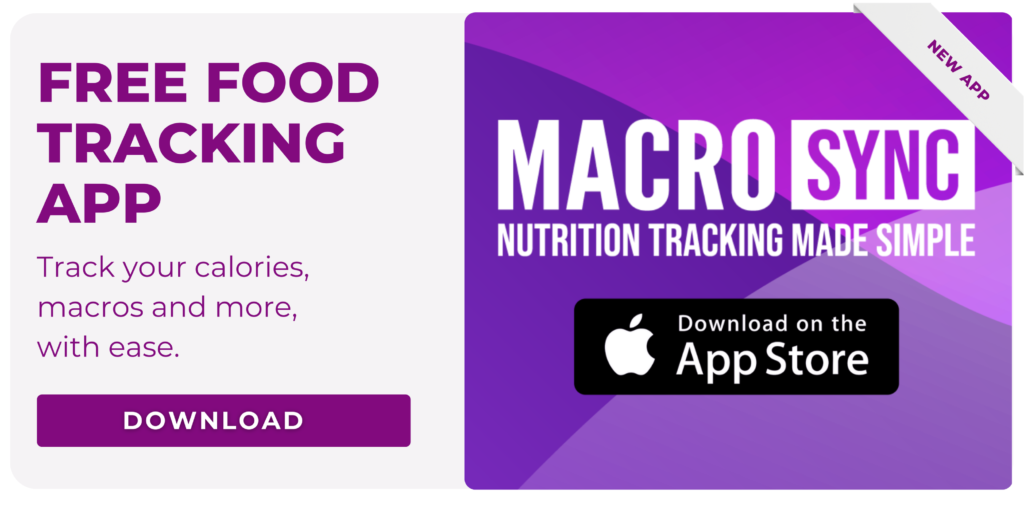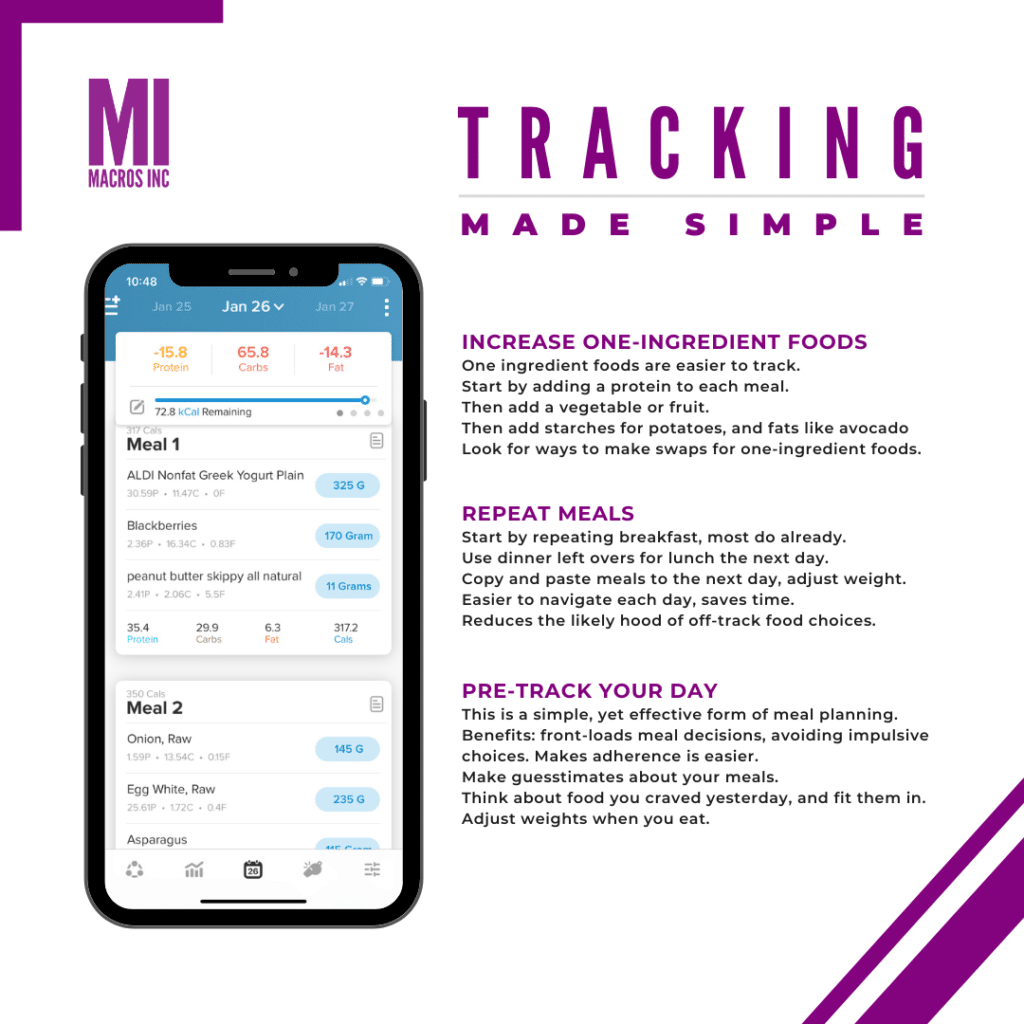Many successful diet plans will tell you that healthy eating is as much about awareness as it is the actual food you eat. A major contributor to this is food tracking—a tactic that can help you implement important lifestyle changes along with better eating habits.
But what are the actual benefits of food tracking, and how do you get started? That’s what we’ll cover in this article, so read on to find out.
Jump to a Topic
What is Food Tracking?
Put simply, food tracking is the process of listing everything you eat and drink. Also known as a food diary or journal, it’s a log of your meals and snacks and, ideally, their nutritional content.
The second part is important for effective dietary changes. After all, it’s one thing to know you ate a plate of pasta, but this doesn’t mean much on its own without knowing its nutritional value. For example, you could be eating healthy food and not lose as much weight as you want. Without tracking nutritional content, you won’t really know why.
The Benefits of Food Tracking
So, now we know what food tracking is, let’s look at why it’s beneficial in the grand scheme of maintaining a healthy lifestyle.
1. Food Tracking Creates Awareness
This is perhaps the most important aspect of food tracking: awareness. As mentioned, it helps you pinpoint potential hidden sources of calories that you might not have otherwise considered.
Similarly, it can help you become familiar with hidden sources of fat or carbs or, on a more positive side, protein. In short, food tracking is one of the most effective ways to know what’s in your food and what this means for your diet.
2. Food Tracking Helps You Reach Goals
Setting diet-related goals is easy, but achieving them can be difficult. For example, deciding you want to lose a set amount of weight doesn’t do much on its own. To get the results you want, you need to know how many calories you should be eating and how many calories you are eating, also known as, CICO.
The same is true for other diet goals, whether these are “eating healthier” or “reducing my carb intake”. Keeping a food diary is a cornerstone of any successful diet plan, simply because it gives you clear information to work with.
There’s not much more to say about this tip—it’s a fairly clear link between cause and effect. A food diary is, in essence, raw data, which you can then use to align your goals or strategy for achieving them.
A food tracker will generally look the same regardless of what you’re trying to achieve. It’s always worth listing the following:
· The food you eat (e.g., a meal or snack)
· The nutritional info if available—calories, macro content
· Portion size where possible
On top of this, it can help to include things like your mood before, during and after consumption. While this might not be necessary for a straightforward weight loss plan, it’s actually pretty useful information for the following benefit.

3. Food Tracking Creates Mindful Habits
Keeping a food journal has the added benefit of changing your relationship with food. Preventing ourselves from eating our favorite food can often feel a bit oppressive. But keeping a food diary can be a good way to continue eating these foods.
For example, your favorite food is chips. Typically, these are fairly empty calories and a big source of fat and salt. But if you’re tracking food, you can be mindful of your portion sizes and excess salt intake. In turn, this allows you to still eat chips, just with a greater understanding of what they mean for your overall food intake.
This benefit goes back to the awareness point mentioned above. A successful diet change often comes down to lifestyle and your relationship with food as much as simply eating healthier. Knowing what your food contains and what this means for your diet is an important first step to making long-term changes.
4. Food Tracking Gives Measurable and Sustainable Results
Keeping a log of everything you eat and drink can help produce sustainable results because you know where your calories and macros are coming from. Being consistent with your food tracking will change the way you approach recipes and dishes, even before you’ve logged them.
Say you’re having a steak for dinner. You already know this is a decent source of protein. But what else does it mean? What’s the fat content, and does it help if you trim the fat before cooking? What will you pair the steak with to make it fresh and interesting?
Over time, these decisions become second nature. So, while it may seem difficult at the start, consistency is key for sustainable changes to your diet and overall approach to food.
5. Food Tracking Forces You to Be Accountable
Whether consciously or not, it’s easy to justify food choices to yourself when looking back on them. You might justify snacking based on not eating all day, or you might counteract it with a healthy dinner. While this isn’t a massive deal, it can be a quick way into less useful eating habits.
Tracking your food, however, forces you to be accountable for your actions. This is a benefit because, as mentioned, it makes you mindful of your choices. From there, you can start to make active decisions about what you eat.
For example, you look back on your food log and see you ate a lot between meals on a certain day. Having this information in front of you leads you to ask why you did this, and what effect it’ll have on your goals.
This is why it can be useful to log your mood too. Doing so means you have a clear link between food consumption and potential triggers, such as boredom or stress. Being able to review choices in this way helps you to answer the “why” of your decisions, leading to better awareness in the future.
Tips for Food Tracking
The benefits of tracking your food should be fairly clear, so let’s look at some tips for getting the most out of this process. For an in-depth look at food tracking, check out our free guide to flexible dieting.
1. Learn as You Go
Tracking food intake is a learning curve, so don’t beat yourself up if you make mistakes. Instead, learn from what worked and what didn’t for your specific goals. Be consistent and take time to review the process to see if you can make it more effective.
2. Something is Better than Nothing
Sometimes, you might find it hard to get relevant information about what you’ve eaten. Unless a recipe you’ve used has the macros listed, you might get bogged down in calculating portion sizes, amount of protein and carbs, and so on. This isn’t particularly helpful.
Some tracking apps will do this for you, but sometimes you might not have the relevant information. When this is the case, logging something is better than nothing.
It might be a case of searching for the nutritional content of the main ingredients (such as a chicken breast, portion of broccoli, etc.) and then dividing these figures by the number of portions you made. While it might not be accurate down to the gram, it’s better than not logging anything at all.
3. Think about Extra Information
It might help for you to log extra information, such as the time you ate, potential triggers, and so on. This can help you tackle things like late-night snacking or boredom eating.
Again, this depends on what you’re trying to achieve and what you feel are your potential weaknesses when it comes to maintaining dietary habits. If you need a second opinion on any data you gather, consider taking your food log to a qualified nutrition coach to see what they can advise.
4. Don’t Forget about Drinks
Drinks are just as important as foods in your tracker. Sodas, smoothies and alcohol are all major sources of sugar and, by extension, hidden calories. Knowing what you drink and how much is vital for an effective food log.
Similarly, track how much water you drink. Of course, it doesn’t have any calories, but proper hydration is important for healthy eating and lifestyle changes. When in doubt, just log it all!

Food Tracking Apps
Although logging everything in your phone’s notes app is fine, you might benefit from using a dedicated app. These often have nutritional guides for common dishes and ingredients, making your job easier. Some of the best include:
· MyFitnessPal
· MyMacros+
· MyPlate
· Lose It!
· Cronometer
Play around with them to see what works best for you based on your diet and goals.
Final Thoughts
Food tracking is an important foundation on which to build healthy eating habits and diet-related goals. The main benefits it offers are awareness and accountability, as these make you far more mindful of what you’re eating and why.
Make sure you experiment with different apps and tracking habits to find out what works best for your goals. Whatever you choose, don’t let food tracking be a hindrance—it should be fun rather than a chore!
Try our nutrition coaching, for free!
Be the next success story. Over 30,000 have trusted Macros Inc to transform their health.
Simply fill out the form below to start your 14-day risk-free journey. Let's achieve your goals together!

